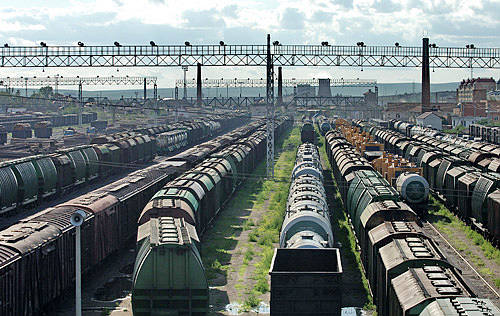|
 |
|
BUSY BORDER CITY: Trains in Manchuria, Inner Mongolia Autonomous Region, loaded with imported crude oil and wood are waiting to be re-transported to the rest of China. Manchuria, a Chinese and Russian border city, has become a tourist and trade hotspot. In 2009, the volume of freight imported and exported through the city exceeded 25 million tons and the number of tourists it received surpassed 2 million. In August 2010, the freight volume and the number of tourists surpassed 100,000 tons and 50,000 a day (LI XIN) |
Yuan on the Rise
The central parity rate of the yuan, China's currency, advanced to a record high against the U.S. dollar on August 4.
The central parity rate of the yuan advanced to 6.7715 per U.S. dollar on August 4 from 6.7722 on August 3, according to China Foreign Exchange Trading System.
The central bank announced on June 19 this year that it would further the reform of the yuan exchange rate regime to improve its flexibility.
Compared with June 18, the trading day just before the reform was launched, the central parity rate of the yuan has climbed 0.82 percent against the U.S. dollar until August 4 while depreciating 5 percent against the euro and 6 percent against the British pound.
Protecting Workers
The Chinese Government has begun to solicit public opinion on a set of draft regulations on the management of foreign labor service cooperation agreements that aim to protect workers sent overseas.
"Problems exist in China-foreign labor cooperation. In some cases, workers' legal rights were not properly protected, which occasionally led to overseas labor conflicts and even mass incidents," said a statement released by the Legislative Affairs Office of the State Council on August 3.
The draft rules have specified market admittance and responsibilities of foreign labor cooperation companies, as well as what the government's role should be in foreign labor service cooperation agreements.
Tariff Removal
China has removed tariffs and value-added taxes on core equipment, components and raw materials imported and used in civilian hitech projects, according to a circular from the Ministry of Finance and related departments.
The move looks to encourage research and development of the nation's hi-tech industry.
The projects that have been exempt from taxation include core electronics, high-end universal chips, basic software, integrated circuit-manufacturing equipment, new generation wireless mobile communication networks, and new drugs for prevention and treatment of some infectious diseases such as AIDS and hepatitis.
Telecom Deal
Nepal Telecom (NT) has signed contracts with Chinese telecom service providers ZTE Corp. and Huawei Technologies Co. Ltd. to work on a package basis to supply equipment to install the Next Generation Network in Nepal, according to local media reports on August 3.
The two Chinese firms will start work on the $19 million project soon by setting up the necessary infrastructure to make the service available within the next six months.
"Under Package A, ZTE will work to make the Next Generation Network service available in the Kathmandu Valley while Huawei will work elsewhere in the country under Package B," said Pramod Kumar Gurung, an NT board member. | 